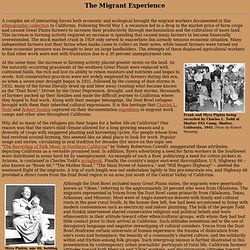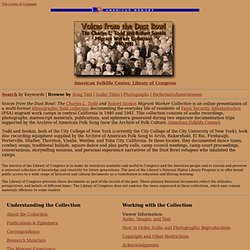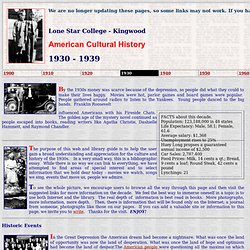

Criticism and Analysis. Biographical Information. The Migrant Experience. A complex set of interacting forces both economic and ecological brought the migrant workers documented in this ethnographic collection to California.

Following World War I, a recession led to a drop in the market price of farm crops and caused Great Plains farmers to increase their productivity through mechanization and the cultivation of more land. This increase in farming activity required an increase in spending that caused many farmers to become financially overextended. The stock market crash in 1929 only served to exacerbate this already tenuous economic situation. Many independent farmers lost their farms when banks came to collect on their notes, while tenant farmers were turned out when economic pressure was brought to bear on large landholders. The attempts of these displaced agricultural workers to find other work were met with frustration due to a 30 percent unemployment rate.
At the same time, the increase in farming activity placed greater strain on the land. Robin A. Voices from the Dust Bowl: the Charles L. Todd and Robert Sonkin Migrant Worker Collection, 1940-1941. The Library of Congress American Folklife Center, Library of Congress Voices from the Dust Bowl: The Charles L.

Todd and Robert Sonkin Migrant Worker Collection is an online presentation of a multi-format ethnographic field collection documenting the everyday life of residents of Farm Security Administration (FSA) migrant work camps in central California in 1940 and 1941. This collection consists of audio recordings, photographs, manuscript materials, publications, and ephemera generated during two separate documentation trips supported by the Archive of American Folk Song (now the Archive of Folk Culture, American Folklife Center).
Todd and Sonkin, both of the City College of New York (currently the City College of the City University of New York), took disc recording equipment supplied by the Archive of American Folk Song to Arvin, Bakersfield, El Rio, Firebaugh, Porterville, Shafter, Thornton, Visalia, Westley, and Yuba City, California. Jan-8-98. Barron's BookNotes for The Grapes of Wrath. Penguin Papers. The Grapes of Wrath. Video Clips: The Grapes of Wrath. American Cultural History - 1930-1939. By the 1930s money was scarce because of the depression, so people did what they could to make their lives happy.

Movies were hot, parlor games and board games were popular. People gathered around radios to listen to the Yankees. Young people danced to the big bands. Franklin Roosevelt influenced Americans with his Fireside Chats. The purpose of this web and library guide is to help the user gain a broad understanding and appreciation for the culture and history of the 1930s. To see the whole picture, we encourage users to browse all the way through this page and then visit the suggested links for more information on the decade. Historic Events In the Great Depression the American dream had become a nightmare. Economics dominated politics in the 1930's. By the beginning of the next decade the United States had gone from a laissez-faire economy that oversaw its own conduct to an economy regulated by the federal government. Library of Congress browsing areas : E -F - U.S. Research Guide: "The Grapes of Wrath"